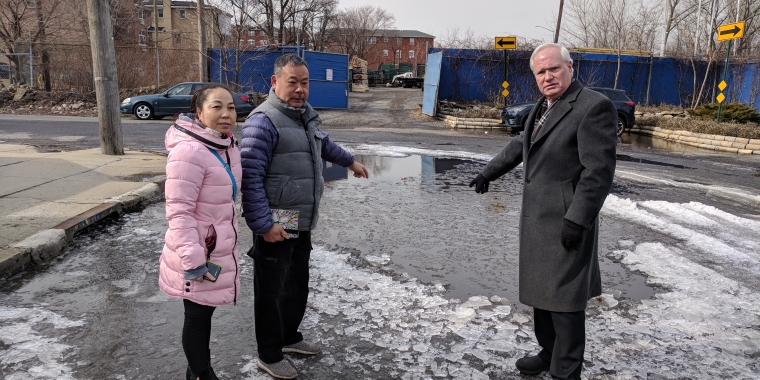
Avella and College Point Residents Call on City to Fix Consistently Flooded Street
February 9, 2018

College Point, NY – This morning, at the top of College Point, State Senator Tony Avella stood with residents of Powells Cove Boulevard to call on the City of New York to finally address a major flooding condition that has plagued this community for over twenty years.
When the Senator and residents gathered on the corner of Powells Cove Boulevard and 126th Street, they stood around a massive pool of water from a rainfall from the beginning of the week that had frozen over and showed no signs of going away. If history is any indicator, there is a good chance that this flood will still be here well into spring.
For two years, Senator Avella has been working with the residents to obtain action from multiple City agencies in order to get the poor roadbed and flooding conditions addressed. Many agencies have inspected the location, including the Department of Transportation (DOT) who blamed the flooding on a lack of storm sewers at the location and claimed that the Department of Environmental Protection (DEP) must address that before DOT can address the road issues.
DEP informed Senator Avella over the summer that they would open a 90 day investigation of the location. Neither the Senator nor the residents have heard what the investigation concluded.
“I’m not sure how the City expects people to live with conditions like this. How they allow their residents to live in such a flood prone area without proper drainage or a sewer is beyond me. Just because these New Yorkers live at the end of College Point does not mean that you should treat them like they live at the end of the world. These New Yorkers have waited too long, something needs to be done immediately. It is absurd that residents are still having to beg for basic City services like storm sewers,” said Senator Tony Avella.
“This condition has been like this for 26 years, the basins are not connected to the New York City sewers. This condition persists year round and in the winter it is like this every day. In the winter when it snows it floods and turns icy and slippery, In the summer time, there’s mosquitoes, it attracts disease, and the debris creates a hazard. The most important thing to do now is to connect the basin to the City sewer to help drain the water. If that was to happen, most of the problem would go away,” said Irina Ngai who lives in the area.
Share this Article or Press Release
Newsroom
Go to NewsroomWEA Will Protect Reproductive Health
August 16, 2014
